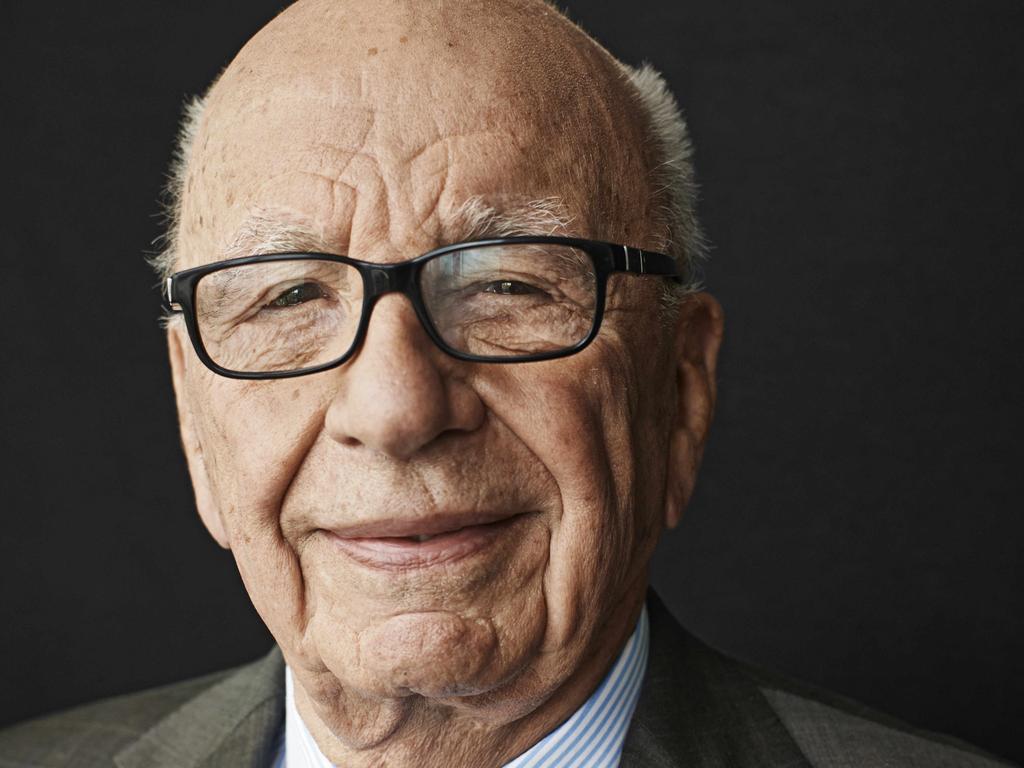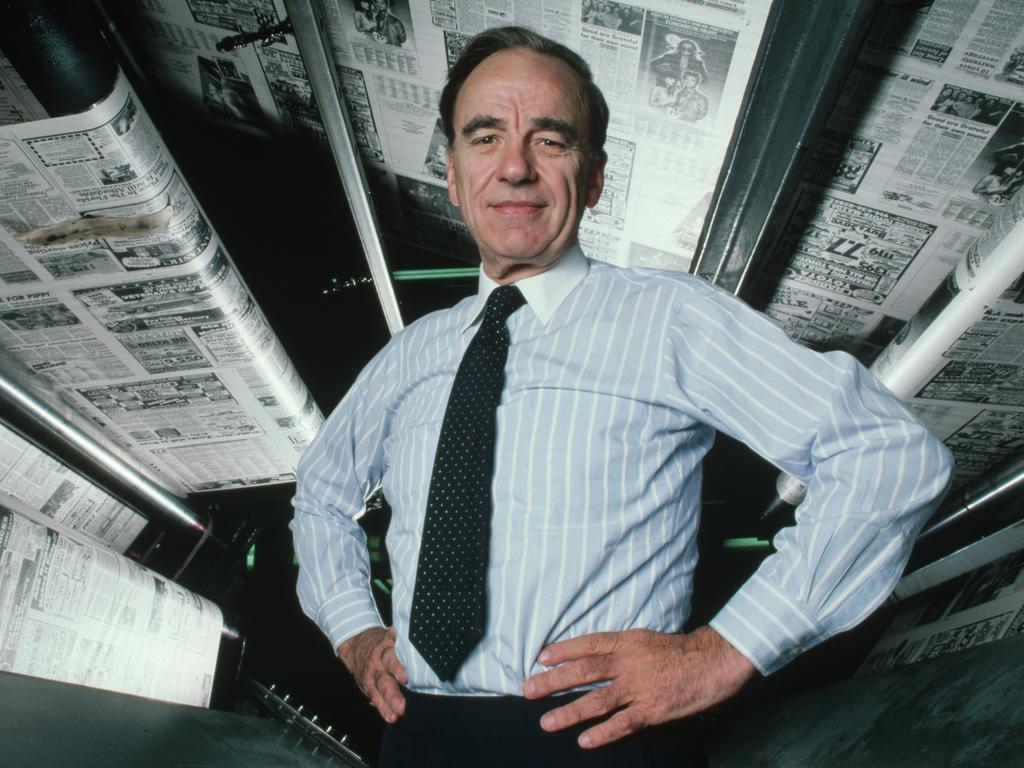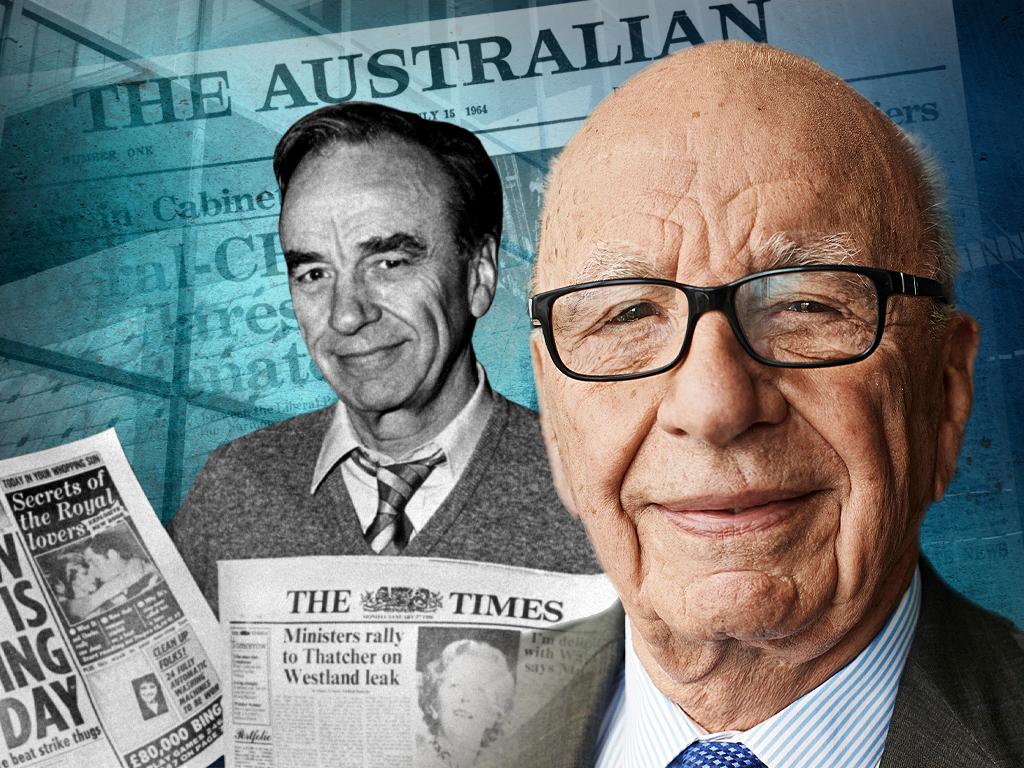Rupert Murdoch: ‘Expect to see me in the office late on a Friday’
The News Corp founder hands over the reigns at the company he founded 70 years ago to his eldest son.

The lifelong newspaper man was short and sharp, pithily to the point. “In my new role, I can guarantee I will be involved every day in the contest of ideas,” Rupert Murdoch said, announcing to staff that he was stepping away from his full time position atop the global media and publishing group he founded 70 years ago.
“Our companies are communities, and I will be an active member of our community. I will be watching our broadcasts with a critical eye, reading our newspapers and websites and books with much interest, and reaching out to you with thoughts, ideas and advice.
“When I visit your countries and companies, you can expect to see me in the office late on a Friday afternoon.”
The 92-year-old will transition to emeritus chair of Fox and News Corp, handing over to his eldest son, Lachlan, in a move that dominated headlines on Friday and moved financial markets.

It caps an astonishing journey for Mr Murdoch that began in 1953 with the struggling Adelaide paper he inherited and took him to a dizzying pinnacle of power and influence over the English-speaking world. It is no exaggeration to say that he is the most successful business figure to emerge from Australia.
The empire he built today spans oceans, continent, industries and media platforms including this masthead, one of Mr Murdoch’s proudest achievements. The News stable is studded with other powerhouse titles: The Times, The Sunday Times and The Sun in Britain; The New York Post and The Wall Street Journal in the US; The Daily Telegraph in Sydney, The Herald Sun in Melbourne, The Courier-Mail in Brisbane, The Advertiser in Adelaide, The Mercury in Hobart, the irreverent NT News in Darwin as well as dozens of regional and local outlets that inform and enliven millions of people.

Fox News is America’s most successful cable news service, while here Sky News leads the televised coverage and analysis of national politics. Harper Collins books is one of the largest and most respected publishers going and News Corp’s digital property listing arm, REA, dominates that lucrative market.
At the centre of it all for the past seven decades has been the larger-than-life figure of Mr Murdoch. His drive, nous and eye for a deal are the bricks and mortar of the multi-faceted company he constructed and now entrusts to his 52-year-old heir, who becomes sole chairman of News Corp and continues as executive chair and CEO of Fox Corporation.
Congratulating his father on a “remarkable” career Lachlan Murdoch said yesterday: “We thank him for his vision, his pioneering spirit, his steadfast determination and the enduring legacy he leaves to the companies he founded and the countless people he has impacted.”
From the start, Mr Murdoch imbued the business with a very Australian can-do approach and disdain for pomposity. Although he came from a moneyed background and attended Oxford University, where he famously kept a bust of Vladimir Lenin in his rooms, earning him the nickname Red Rupert, newspapers were in his blood.
His father, Keith Murdoch, was the pre-eminent journalist of his generation who had famously sidestepped British censorship in World War I to blow the whistle on the bloody debacle at Gallipoli.

Having risen to the top of the Melbourne-based Herald and Weekly Times newspaper and radio station chain, Sir Keith bequeathed a 22-year-old Rupert two dailies, one of which the young man had to sell to pay death duties. The afternoon paper he took over in Adelaide, The News, was dull and bleeding circulation. The fledgling proprietor soon fixed that.
He went after the “establishment” competition, the HW&T-owned Advertiser, in what was to be a template for the insurgencies he would mount against vested interests from Sydney to London, New York and Hong Kong.

He campaigned in Adelaide to free an Indigenous man, Max Stuart, who was to be hanged for murder on the basis of a confession the police allegedly beat out of him. When SA premier Thomas Playford went after Mr Murdoch and The News’s editor for libel, the scrappy paper ramped up its coverage, delivering a handy spike in sales. Stuart’s death sentence was ultimately commuted and Mr Murdoch chalked up one of his first big wins. More would follow.
He bought the Sunday Times in Perth in 1956, the same year he married Patricia Booker, the mother of eldest child Prudence. In 1959, he broke into television, starting an Adelaide station, NWS-9.
He bought the Sunday Times in Perth and broke into television, starting an Adelaide station, NWS-9. In 1960 he gained a foothold in Australia’s prime media market with the acquisition of The Daily Mirror in Sydney. Four years later he defied the naysayers to launch The Australian, the country’s first general interest national daily, originally headquartered in Canberra. Mr Murdoch would rush to the airport in his pyjamas night after freezing winter’s night to shepherd production plates onto an aircraft to send the paper to press. The Oz turns 60 next year, more profitable and widely read than ever.
Eventually, he persuaded the formidable Frank Packer to sell him The Daily Telegraph in Sydney. But Australia was never going to be enough to contain Mr Murdoch’s ambition: he raided Fleet Street, taking over the News of the World, buying and relaunching a tired broadsheet called The Sun. His first foray into the US was to snap up the San Antonio Express and Evening News in Texas in 1973, when he was still in his 40s and raising a family with second wife Anna Mann, followed by the iconic New York Post. Spotting a gap in the American market, he set up a lively supermarket tabloid, The National Star.
The 1980s was a decade of boom and nearly bust for the growing News group. Mr Murdoch brought The Times of London and The Sunday Times into the fold after the titles’ Canadian owner was worn down from battling the powerful print unions. With the backing of Conservative Party prime minister Margaret Thatcher, he took on the British labour movement to establish a non-union plant at Wapping in London’s East End, a fight no other publisher would have. Mr Murdoch held his nerve and prevailed.

There seemed to be no stopping him. In the US, Mr Murdoch acquired newspapers in Boston and Chicago and a controlling interest in the 20th Century Fox film studio, a Hollywood institution. When his Australian nationality threatened to get in the way of adding a string of TV stations to the Fox brand, he took out US citizenship. In Hong Kong, he got the vastly-profitable South China Morning Post for a bargain price after professing to be uninterested in buying the English-language paper.
And in 1987, he bought back the farm in a takeover of the Herald and Weekly Times after Bob Hawke’s Labor government changed Australia’s media ownership laws to accommodate Mr Murdoch, giving him newspaper monopolies in Brisbane, Adelaide and Hobart and the satisfaction of reclaiming the company his father had once headed.

But the freewheeling ’80s hit the wall on Wall Street on Black Tuesday, October 17, 1987. The Dow plunged by an eye-watering 22 per cent, the biggest loss in a single day of trading in its history, creating shockwaves that reached all the way to the Australian market. Money poured into property and other fixed assets, creating a bubble that in turn burst.
Suddenly corporate debt was a dirty word for the banks. In 1990, as the world fell into recession and over-leveraged entrepreneurs such as Alan Bond, Christopher Skase and John Spalvins crashed to earth, the Murdoch empire was pushed to the brink when a provincial US bank holding a fraction of News’ $7.6bn in international borrowings demanded immediate repayment of a relatively paltry $10m.
A default would have created a domino-effect among the company’s lenders, but the credit officer at the Pittsburgh National Bank was adamant: if it had to go under, so be it. A chastened Mr Murdoch was forced to accept strict limitations on his purchasing ability as part of a complex financial rescue package.
And for a time, he retreated. By 1996, however, he was back in the expansion business, launching Fox News to take on Ted Turner’s cable behemoth of CNN in the US, a transformative move pitched to viewers who leaned to the right politically and felt alienated by a perceived leftwing bias in much of the mainstream media.
Even as his stature grew, Mr Murdoch viewed himself as an outsider, a maverick bucking the establishment who had to challenge the incumbents to break into new businesses.
“I’ve had no choice to be anything but a catalyst for change,” he said in a 1996 speech at the National Press Club in Washington. “That sometimes results in your being treated like the skunk at a tea party. But that’s the fate of anyone who challenges the status quo.”
In his memo to News and Fox staff, he wrote about what he sees as a continuing battle over freedom of speech and thought. “Elites have open contempt for those who are not members of their rarefied class,” he wrote. “Most of the media is in cahoots with those elites, peddling political narratives rather than pursuing the truth.”
Mr Murdoch weathered other setbacks, including the collapse of his marriage to Ms Mann – the mother of his three children who have been actively involved in the company, Elisabeth, 55, James, 50, and Lachlan – and subsequent divorces from Wendi Deng (1999-2013, mother of Grace, 20, and Chloe, 18) and the model and actor Jerry Hall (2016-2022).

A 2011 scandal over reporters at the now-defunct tabloid The News of the World illegally hacking phone messages to gain information for stories delivered Mr Murdoch “the most humble” day of his life when he was called before a parliamentary inquiry in Britain to answer for the abuses; until then, James Murdoch as head of the News International division in the UK had appeared to be best positioned among the children to succeed their father. He and Lachlan combined to force out Fox News founder Roger Ailes in 2016 over a sexual harassment scandal at the network, but then fell out, leading to James’s departure from the company in 2020.
Perhaps the biggest challenge came when voting company Dominion Voting Systems sued Fox News for defamation, alleging that Fox hosts and guests amplified claims that it helped rig the election last US presidential election for Joe Biden over Donald Trump.
Fox agreed this year to pay $US785.5m ($1.23bn) to settle the dispute, but not before court proceedings resulted in the disclosure of a trove of internal Fox communications that cast the network in a negative light, showing top executives and hosts were sceptical of Mr Trump’s election-fraud claims, even as Fox aired them. The company faces a similar lawsuit from voting-machine company Smartmatic.
After building and reshaping his holdings over decades, Murdoch split up his business in 2013, with the publishing assets keeping the company’s original name, News Corp, and the entertainment assets going to 21st Century Fox.

The composition of the family empire changed dramatically again when Murdoch agreed in 2018 to sell a substantial portion of 21st Century Fox to Disney in a $US71bn ($1.1bn) deal, a transaction many media executives say was prescient given that entertainment giants have since fallen on hard times. The remaining assets became part of the newly formed Fox Corp.
Last year, Mr Murdoch proposed a plan to reunite News Corp and Fox, but he called off the effort in January, saying the transaction wasn’t optimal for shareholders at the time.
Mr Murdoch continues to be a major shareholder in the two companies. He and his family have a roughly 40% voting stake in News Corp and about a 44% voting stake in Fox Corp, according to securities filings.
As he gained control of newspaper, television and movie properties on three continents, Mr Murdoch became a polarising figure. His critics said he had too much power to shape public opinion, politics, culture and business. As Fox News grew more influential in Republican and conservative politics, he became a target for Democrats and liberals.
But Mr Murdoch insisted all too characteristically that he was looking forward, not back, as he transitioned to this new time of life. “Our companies are in robust health as am I,” he informed staff. “Our opportunities far exceed our commercial challenges. We have every reason to be optimistic about the coming years – I certainly am, and plan to be here to participate in them.”
Additional reporting: The Wall Street Journal.







